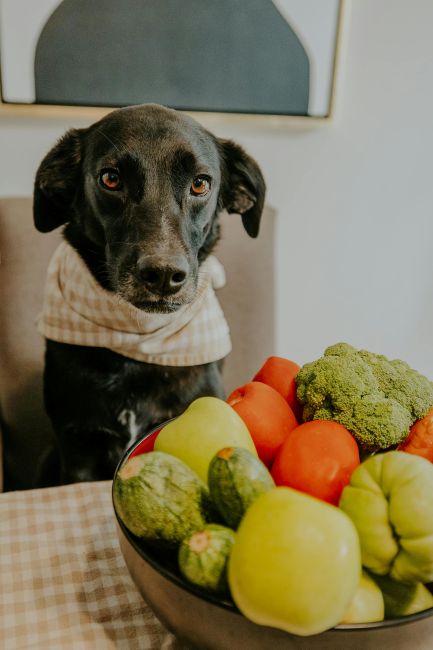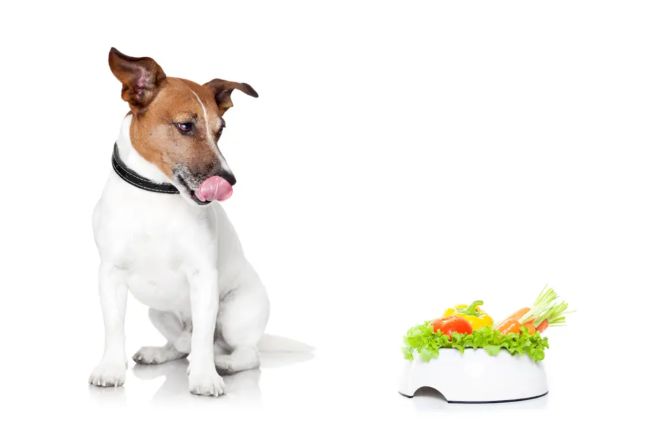Ever been to a restaurant and notice you pup sitting and look at you with those big eyes? Sometime imbalances a person wonder – Are dogs able to be on a Vegetarian Dog diet? More so, can they possible do well with no meat at all?

With families adopting various plant-based meal options for themselves, this question is getting more focus these days. It’s just a matter of time that dog owners begin to start wondering themselves if their pets can accompany them with this diet.
To put it in a more straightforward way, I am going to cover all essentials that I can find to provide you with a more insightful information about dog diet with no meat.
You May Also Like: Important Pet Care Tips for Every Pet Owner in 2025
Can Dogs Be Vegetarians?
The good news is that dogs are omnivores. They can digest and use both plant and animal foods. Dogs are much better suited digestive-wise than cats (which are compulsive meat eaters and need meat to even live).

Throughout the years, dogs have lived with humans and have utterly transformed to eat a variety of foods, ranging from grains to even the scraps that are found on the dinner plate. A dog can, in theory, live on a vegetarian diet. Living is different from thriving though, and it is a much different concept.
For dogs, a vegetarian diet must be strategically constructed in a way that satisfies all the nutrients fundamental to supporting and sustaining one’s vitality and growth.
Why Some Owners Choose
A Vegetarian Diet for Dogs As with any meal plan, especially for dogs, there are multiple underlying reasons why people opt for a vegetarian diet for their pets:

- Ethics – It is common for people to follow a vegetarian lifestyle and may wish to do the same for their dogs for personal or religious reasons.
- Concern for the planet – Pets on a meat diet contribute to the meat industry’s ecological footprint which is very high. Feeding a dog a vegetarian diet will help mitigate the family pet’s contribution.
- Health problems – Certain dogs will have food allergies especially to very typical proteins such as chicken, beef, or lamb. A Vegetarian Diet can lessen exposure and flare-ups to skin and stomach problems.
- Ethics again – A dog owner must consider what their food choices are first. For people who do not eat meat, it is a personal decision to impose the same philosophy on their pets.
Every reason outlined above is plausible, but it comes with the added challenge of ensuring the dog’s diet is complete and balanced.
The Critical Nutritional Elements For Dogs
While focusing on a dog’s diet, there are some essential nutrients a dog simply cannot do without. The most difficult vegetarian diets faced will center on these nutrients:
- Protein – Dogs require protein of good quality because dogs need protein to build the muscles, repair the tissues. Plant protein like chickpeas, lentils, legumes, quinoa, and soy can also be used, but they must be partnered appropriately to provide all the essential amino acids. They is best in combination to achieve the level of essential amino acids necessary.
- Vitamin B12 – This is the case for most vitamins, and for this case, vitamin B12 is naturally found only in animal products. The vegetative dogs will obviously need some sort of supplementation for this vitamin.
- Taurine & L-Carnitine – Important amino acid-like compounds necessary for heart health that could be supplemented through existing plant-based diets. These Omega 3 fatty acids are contained in flaxseed and chia and are known as ALA, and the marine based acids are harder to find, but can be found in algae oil.
- Fatty acids – Omega-3 are very important for skin, coat and brain health. Flaxseed and chia provide ALA, but in large quantities it would still be difficult to replace marine based DHA and EPA. Algae oil can provide DHA and is a good vegetarian source.
- Minerals – These are iron, calcium and zinc, and are harder to absorb and most likely encountered in plant foods, and are for these reasons, are most likely to be deficient.
If a vegetarian dog’s diet is deficient in these vitamins and minerals for some time, the dog’s coat, energy levels, and in puppies, the growth rate, will all take a toll.
Store-Bought vs. Homemade Vegetarian Dog Food
If you are considering a vegetarian option for your dog, there are two main pathways you can take:

1. Commercial plant-based prescription dog food
Many commercial pet food manufacturers now produce vegetarian or vegan pet food formulas approved by AAFCO. The formulas go through testing to ensure they meet dogs’ nutritional needs. Buying and feeding one of the products on this list is the safest choice if you want to avoid meat completely, but do not want to risk missing an important nutrient.
2. Prepared Meals
Some owners do feel it can be rewarding, as well as, preparing home-cooked meals for their furry buddies. On the other hand, if the proper precautions are not taken, it can be life threatening. More often than not, dogs are prone to certain specific nutrient ratios; and it’s all too easy to miss out on one. If you are hell bent on preparing meals for your furry friend, you are better off consulting with the veterinarian first to draw up a complete plan.
Example Vegetarian Ingredients for Dog Diet
A vegetarian diet, planned thoughtfully, may contain:

- Brown rice, quinoa and oats for energy
- Sweet potato, pumpkin and carrot for vitamins and fiber
- Spinach, kale, green beans for minerals
- Flaxseed and chia seeds for fats
- Fortified supplements as b12, taurine, and omega-3s
Keep in mind, portion size varies based on size, age and energy level. A lazy old pug will not have the same energy needs as an active border collie!
Benefits of Feeding Your Dog a Vegetarian Diet
- Can lessen certain food allergies
- Could improve digestion for sensitive dogs
- Ethics, and supplants for climate change
- Dogs usually like the flavors and the different textures
- Lower in saturated fats than meat oriented diets.
Cons and Challenges
- There is a risk of nutrient deficiencies if not balanced.
- Some dogs will refuse to eat particular plant proteins.
- Supplementing is almost always necessary.
- There is very little long-term health data on dog vegetarian diets.
- Not appropriate for all dogs—puppies, nursing mothers, or dogs with certain health conditions
What Experts Say
Veterinarians are typically conservative. Most feel that dogs can thrive on vegetarian diets – if they are formulated properly – but point out that this is a result of extreme amounts of planning and vigilance. Their general recommendation is to have regular blood work done to screen for any possible nutrient deficiencies.
Some veterinarians feel more comfortable recommending vegetarian diets in a small subset of cases, like dogs with extreme allergies to meat products. Others have recommended feeding your dogs commercial vegetarian food rather than making your own, as they would have been tested for balance.
Tips to Transition to Vegetarian Dog Diet
If you’ve decided to give it a go, here are some tips to help transition your dog:
- Monitor closely – watch energy level, stool quality, skin, and coat.
- Supplement – Do not skimp on vitamins and minerals because supplements are important. Ask your veterinarian for recommendations.
- Follow up – be sure to schedule blood work at least once per year to monitor any critical nutrients.
- Be flexible – it is OK to go back to a less alternative diet if your pooch does not adjust to a vegetarian diet. Health is the number one priority!
The Bottom Line
So, should you put your dog on a vegetarian diet then? The answer is maybe. It depends on why, your dog’s state of health, and whether you are willing to commit to do it right.
There is nothing presumptuous in making a well-considered decision to feed a balanced vegetarian diet to your dog that may facilitate attuned animal welfare. But it is not as simple as exchanging your pet’s kibble for carrots. Nutrition ultimately comes down to balance, supplements, and support (and regular consultation) from a veterinarian.
At the end of the day, your dog could care less as to whether their protein comes from lentils or lamb. They are preoccupied with whether they feel good, get to play, and spend time with you. If a vegetarian diet allows your dog to thrive and meet with your own foreseeability for mealtime ethics, then it is an appropriate option. Just ensure that science and health warrant your decision-factory rather than emotional stimuli.
Vegetarian Dog Diet: What Every Pet Owner Should Know
Ever been to a restaurant and notice you pup sitting and look at you with…
Creative Rooftop Party Ideas to Host the Perfect Day
Rooftop party is in trend these days. This is one such idea that transforms a…
Healthy Cooking Tips for a Balanced Lifestyle
Healthy cooking is the basis of an impartial lifestyle. Everybody needs to be fit and…
Simple Dog Training Tips Every Owner Should Know
Dog training is an important procedure that each pet owner has to learn. A compliant…
Budget-Friendly Home Decor Ideas For Every Space
Home decoration is an important part of life as a beautiful and stylish home is…
Family Gardening Activities That Kids Will Love
Gardening activities refresh family life. Children love nature and plants help them develop their skills….






